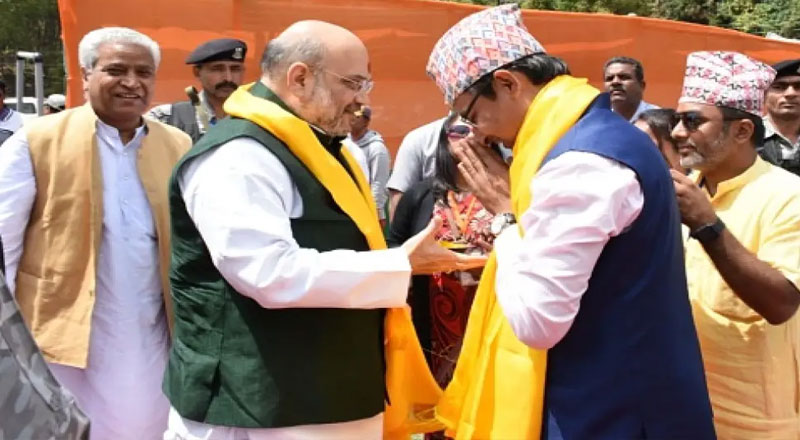If both Bharatiya Gorkha Prajatantrik Morcha and Hamro Party allies with the Trinamool Congress, it will be very difficult for the Bharatiya Janata Party to retain the Darjeeling Lok Sabha seat, says Harka Bahadur Chhetri.
Harka Bahadur Chhetri, a retired high school teacher known as an intellectual among politicians in the Darjeeling hills, is a former MLA from Darjeeling’s neighbouring hill station of Kalimpong. He spoke to Snigdhendu Bhattacharya on recent political trends of the Queen of the Hills.
One thing is very clear. The whole process, starting from campaign to voting and results, was very peaceful. The reason is that none of the political parties was in a position to dictate terms over the people, which was the trend from 1986 (when Subash Ghishing’s GNLF used to have the last word) and again 2007 onwards (when Bimal Gurung’s GJM enjoyed the same clout). There has always been a one-party rule here, with their own diktats. People did not feel free to participate in political activities. That has changed with the emergence of the new parties. The large number of candidates that contested these elections reflect the fear factor is gone.
Did you expect the electoral outcome?
The outcome is a little unexpected. People expected a divided opinion and a hung house in the GTA. But the Bharatiya Gorkha Prajatantrik Morcha (BGPM) got a clear mandate. The Hamro Party, which won the Darjeeling municipality, did not have much organisational strength outside the town but the BGPM had their basic organisational structure. So, they benefitted.
What do you make of the people’s mood from the outcome of the elections?
The low polling rate of 56 per cent disallows a proper assessment of the people’s mood. As much as 44 per cent did not vote. A higher polling percentage would have helped assess the mood properly. There are multiple reasons behind the poor poll percentage.
A section of people seemed to have become disillusioned with the electoral process, while some thought there was nothing worth wasting a day to stand in a long queue. People have become somewhat complaisant, lethargic. None of the parties really inspired people to come out and vote. There was no charged campaign or a big rally. The campaign was mostly door-to-door.
Didn’t the election boycott call from the BJP, the GNLF and the GJM have any impact on the poor polling rate?
I don’t think there was any significant impact. Everybody understood that their demand for greater autonomy than GTA, was merely a mask to hide behind. They fared poorly in the Darjeeling municipality election and the outcome would have most likely been the same in the GTA polls, had they contested it. Everybody understood this.
The BJP and the GNLF have lost public sympathy because people have realised that their talk of a permanent political solution is nothing but lip service. Repeated clarifications from top BJP leaders, saying they are against bifurcation of West Bengal, have not been received well by the political leadership and people of the Darjeeling hills.
What prospect do you see for the BJP-GNLF alliance?
I think they made a blunder by boycotting the election. Participating in the election would have kept their workers active and charged. Whatever seats they could have won would have helped them in maintaining public contact through local development work. Now, all the development work that will take place, will be carried out by their rivals.
It is difficult to stay afloat without being in power, and in position to deliver something to the people. I think they have broken their own backbone and now there will be further erosion in their support base. Why would people go to them?
The BJP has won Darjeeling Lok Sabha since 2007, thanks to support from the hill-based parties. Could there be implications on the 2024 Lok Sabha elections?
There will definitely be implications. These new parties plan to work in cooperation with the state government and would tend to ally with the state’s ruling party in the Lok Sabha election, according to my assessment. If both BGPM and Hamro Party allies with the TMC, it will be very difficult for the BJP to retain the seat.
What changes in the hills do you expect now?
I expect things to become better. This new GTA body will work in cooperation with the state and will have no excuse to put allegations against the state. The practice of the previous regimes was to do sloppy work and then blame it on the state government’s non-cooperation. Now, I am sure the state will extend full cooperation, which should lead to better development work.
Since no hill party enjoys absolute majority, there will be competition and parties in administration will be answerable to the people. They have a lot of responsibility and opportunities as well. All these factors should help expediting development projects.
What work should the GTA prioritise?
Their first priority should be to address the question of land documents of both tea garden and cinchona plantation residents. They need to distribute patta. Generations are living in these plantation areas but they have no records. This law has to change. The chief minister had publicly sympathised with the issue and the GTA should immediately take it up with the chief minister.
The second important issue is to solve the water crisis. Then, there is the question of employment generation. There is a need to set up a regional school service commission for the GTA area and there is a legal provision for it. This should help fill up vacancies in regional schools and generate local employment. Revival of local industries such as silk, horticulture and floriculture can also help employment generation. Better roadways and electricity supply is required for the homestay sector to boom. There is a lot to be done but these should be the priorities.





